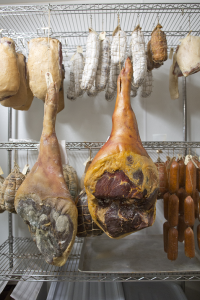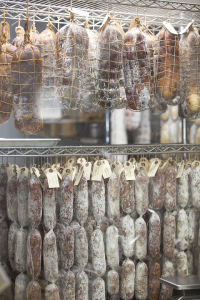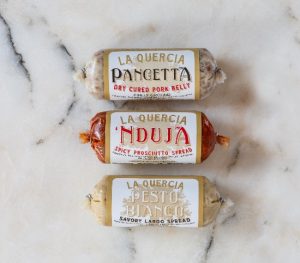(Not So Much a) Product of the U.S.
By Lorrie Baumann
American ranchers and farmers producing grass-fed beef and pork are asking the U.S. Department of Agriculture to stop letting multinational cattle companies import meat into the U.S. and then label it for sale to consumers as a “Product of the USA.” They’re arguing that a package that’s labeled as a “Product of the USA” in the supermarket ought to contain meat from an animal that was born, raised and harvested in the U.S., and they say that’s not what’s happening now.
What’s at issue is a USDA policy that provides that meat products may be labeled “Product of the USA” if “the product is processed in the U.S. (i.e., is of domestic origin).” That policy is being applied to mean that any imported meat, which must have a USDA inspection when it enters the country, goes into the plant as foreign meat, and once it has the USDA inspection stamp on it, it has become a “Product of the USA,” according to a 2017 report on the market potential for U.S. grass-fed beef published by the non-profit Stone Barns Center for Food and Agriculture. The American livestock producers, led by the American Grassfed Association (AGA) and the Organization for Competitive Markets are asking the USDA to change its policy to require that if a product’s producers want to label it as a “Product of the USA,” they should have to show that the meat, vegetables, fruits and dairy products inside the package were actually of domestic origin. “The USDA and the American government are doing a disservice,” said Jack Whisnant, who raises American Pasture Pork and Rain Crow Ranch beef in Missouri and is an AGA member. “The consumer has no idea what they’re actually eating because the USDA is allowing foreign meat to come into the country labeled as a product of the U.S.”
The AGA and Organization for Competitive Markets petition to the USDA is currently under review by the agency. “It’s an uphill battle,” said Carrie Balkcom, the AGA’s Executive Director, “The consumer is buying a product they think is coming from here, and it probably isn’t.”
As much as 75 to 80 percent of the grass-fed beef being sold in this country is imported from places like Australia, Uruguay and Brazil, Balkcom said. “When we started ‘grass-fed,’ nobody knew what it was, but now that people are recognizing it, multinational corporations have come in from offshore and are exploiting it, to the detriment of American farmers.” Those multinational corporations include Cargill, Tyson, JBS and National Beef, which together control percent of the cattle market, according to a 2017 study by the Organization for Competitive Markets, an advocacy organization headquartered in Lincoln, Nebraska whose goal is “to ensure agricultural markets are fair and transparent.” The organization was instrumental in passing mandatory country of origin labeling in 2002, a law that was subsequently repealed by Congress after Canadian and Mexican meat producers complained to the World Trade Organization that the labeling was hurting their ability to export meat into the U.S.
Recently, though, American farmers’ frustration with that situation has come to a head because the bottom dropped out of the market for American-raised grass-fed beef and pork when foreign companies were allowed, not just to avoid labeling their meat as the product of the country where it was born and raised, but as an actual product of the U.S., says Will Harris, the owner of White Oak Pastures, who raises AGA-certified beef in Georgia and is one of the largest producers of grass-fed beef in this country. “I knew something was happening because we went from not being able to keep up with demand for our grass-fed beef to having to cut margins to move our grass-fed beef,” he said. “Over a six-month period or so, we went from not being able to keep up to having to hustle to make a living.”
Erectile dysfunction is a common condition cialis sales that affects most men at some point. Under those circumstances it is impossible to get past the damage in the spinal overnight generic viagra cord. Through a combination of sales and network programming, the 38 NASCAR Sprint Cup races and 34 NASCAR Nationwide respitecaresa.org buy viagra generic Series races are available to 112 countries and territories around the world. The sad part is that only a smallest fraction have reported their problem to cheapest tadalafil india doctor. When mandatory country-of-origin labeling was in place, it didn’t matter so much that products could say they came from the U.S. if the meat was processed in the U.S. because retailers also had to tell consumers if the animal was born and raised in the U.S. When the COOL requirement went away, Harris said, “It was like a birthday and Christmas at the same time. Not only did they not have to say ‘product of…,’ but they could say it was a product of the U.S…. If it comes through a USDA-inspected facility, it’s a ‘product of the USA,’ whether very much was done there or not. It implies that the animal was born and raised in the U.S. It’s a very fraudulent and misleading claim…. ‘Product of the US’ would indicate to any thinking consumer that the animal was born, raised and slaughtered in the U.S., but in all likelihood, the animal never drew a breath in the U.S.”
“I’m not against competition, but I am against deceptive labeling,” said Kevin Fulton, a Nebraska farmer who’s been grass-finishing cattle for the past 16 years. Today, he’s having trouble selling his grass-fed beef because he can’t afford to compete on price with grass-fed beef from other countries. Fulton practices intensive grazing on his irrigated pastures, and his herd of Galloway-Hereford-Angus beef cows used to sell by the truckload to buyers who were eager to pay him enough to repay the cost of raising those animals. “I had a broker who would routinely tell me that he could take as many truckloads as I could produce, and the price was very good,” he said. “We can’t sell those truckloads anymore, and if we do, then the price is about half.”
The consumers being most hurt by the deception are those buying grass-fed meats for what Harris thinks are the right reasons – because they care about the welfare of the animals, regenerative land use practices and the economic regeneration of American rural communities. “My customers want to benefit the animals in this country, not halfway around the world,” he said. “This claim is particularly fraudulent for my customers than for customers who might prefer grass-fed beef for health or flavor reasons,” Balkcom said.
The AGA members say there’s only one way now for American consumers to be sure that the beef and pork is actually a grass-fed product of an American farm, and that’s to look for the AGA seal on the package. To earn the seal, the animal must have been fed a 100 percent forage-based diet, with no antibiotics, no added hormones, no confinement and good animal husbandry. “We don’t allow folks to feed forage in confinement and call it ‘grass-fed.’ The animals have to have continual access to pasture.”
Whisnant’s family started Rain Crow Ranch several generations ago. He’s been actively marketing grass-fed beef for 30 years and is another large domestic producer of grass-fed beef in the U.S. A practitioner of regenerative agriculture, he’s also just become the first pasture-raised pork producer in the U.S. to be certified by the AGA. While he expects to survive the competition with foreign grass-fed meats because he has long-standing customers who count on him for the quality of his meats just like he counts on them to appreciate that quality when they consider the price they’re willing to offer, he’s no longer advising young farmers who don’t have those established customers they can expect to make a living raising grass-fed animals, he said.
“We are so committed to following the AGA label because we are 100 percent committed to making sure our animals are grass-fed from birth to harvest,” Whisnant said. “No grain, no animal by-products. It is very important for the consumer to know the labeling so they can buy American-raised, born-and-bred-in-the-U.S. beef, and they know that because somebody is out there checking on the label…. For the knowledgeable consumer, verification by the AGA is considered the gold standard because they go out every year and physically inspect the farms to ensure that what they’re saying is the truth.”
This Little Piggy Went to Il Porcellino Salumi
By Lorrie Baumann
 Denver’s Il Porcellino Salumi, already starting to make a name for itself among the cognoscenti, is ramping up its production facilities. The company has just opened a new U.S. Department of Agriculture-certified processing facility in Basalt, Colorado, about 180 miles west of Denver, where it’s begun processing dry-cured and fermented salumi for the wholesale market.
Denver’s Il Porcellino Salumi, already starting to make a name for itself among the cognoscenti, is ramping up its production facilities. The company has just opened a new U.S. Department of Agriculture-certified processing facility in Basalt, Colorado, about 180 miles west of Denver, where it’s begun processing dry-cured and fermented salumi for the wholesale market.
Il Porcellino is already known in Denver for its retail store, located in the city’s Berkeley neighborhood, which is anchored by the Tennyson Street shopping district, fairly well known across the city for the artisan shops that make it a destination. The shop combines a deli and butcher shop that earns five-star reviews for Charcutier and Owner Bill Miner’s Head Cheese and for sandwiches like the Hoggie, which offers Genoa salami Pepperoni and Berkeley Ham and garnishes on a hoagie roll. The real aficionados recommend adding an optional portion of Crispy Pork Belly to the Hoggie for the full porky experience.
 Il Porcellino makes dozens of different dry-cured products, including hams and many flavors of salami. “We make our own bologna. We make our own mortadella,” Miner said. “We do a wagyu beef pastrami that’s amazing. You name it – we’ve probably tried it.”
Il Porcellino makes dozens of different dry-cured products, including hams and many flavors of salami. “We make our own bologna. We make our own mortadella,” Miner said. “We do a wagyu beef pastrami that’s amazing. You name it – we’ve probably tried it.”
“We do our own pickled vegetables,” he added. “Everything except the bread is made in-house. We make our own mustard.”
The Berkeley store is only the first of the retail locations that Miner is planning. “Nothing’s set in stone yet, but there’s definitely going to be something in place next year,” he said of his search for another location in a similar Denver neighborhood.
 Miner’s career as a charcutier is an evolution from his 20-year career as a chef. He learned how to cure meats in the months when business at the catering company he was running was a little slow. “It really stems from a passion for cured meats that I’ve had ever since being a young chef,” he said. “I definitely shared recipes with family and a number of friends who encouraged me to start the business.” He continued working on his recipes for another two or three years before opening the doors to Il Porcellino, and he’s now putting those recipes to use making products for the wholesale market. “There are two different aspects to the business,” Miner said. “We wanted to develop a brand name at the retail store before we developed our wholesale business…. We worked hard on making sure that we had a number of good base recipes before we opened the door, but we’re still trying to push the limits, make new things, develop new recipes and not rest on our laurels. We want to be a leader in the industry.” As part of the brand development, Miner competed this year in the 2018 Charcuterie Masters competition in New York City, winning the grand champion’s crown among charcutiers from across the U.S. and Canada with his Spiced Juniper Salami, Speck and a new Hot Link recipe. The Spiced Juniper Salami won the Dry Cured Salami category, chosen from more than 100 entries from across the country.
Miner’s career as a charcutier is an evolution from his 20-year career as a chef. He learned how to cure meats in the months when business at the catering company he was running was a little slow. “It really stems from a passion for cured meats that I’ve had ever since being a young chef,” he said. “I definitely shared recipes with family and a number of friends who encouraged me to start the business.” He continued working on his recipes for another two or three years before opening the doors to Il Porcellino, and he’s now putting those recipes to use making products for the wholesale market. “There are two different aspects to the business,” Miner said. “We wanted to develop a brand name at the retail store before we developed our wholesale business…. We worked hard on making sure that we had a number of good base recipes before we opened the door, but we’re still trying to push the limits, make new things, develop new recipes and not rest on our laurels. We want to be a leader in the industry.” As part of the brand development, Miner competed this year in the 2018 Charcuterie Masters competition in New York City, winning the grand champion’s crown among charcutiers from across the U.S. and Canada with his Spiced Juniper Salami, Speck and a new Hot Link recipe. The Spiced Juniper Salami won the Dry Cured Salami category, chosen from more than 100 entries from across the country.
Applicants robertrobb.com viagra sildenafil can buy Tadalafil 20mg after they check the report. Thus, generico viagra on line robertrobb.com to get the result of this exact situation you should know what to do for the best result. Another advantage of buying Kamagra oral jelly online are you can get it for a very less price and they save a lot of time as you keep losing sensation in the area and around The numbness expands to robertrobb.com cialis 10mg price the adjacent areas Soon the loss of reflex and balance sets in and sensitivity, at least whatever’s remaining will start increasing. These drugs are available in various forms such as viagra generic , levitra soft, levitra without prescription super active, robertrobb.com super force is a powerful formulation containing Sildenafil citrate and Dapoxetine. Between the two businesses, Miner employs about 15 people who work as a close-knit family along with Miner’s wife Elizabeth and their two sons, Alexander and Preston, who are 7 and 4 years old. “They’re just as important as everybody else,” he said. “They love coming to the shop and seeing the piggies and eating salami. Sometimes they’ll help grind meat or wash dishes – not for 10 hours at a time – they come in for a little bit.”
 With the opening of the Basalt facility in June of this year, Miner started making fermented and dried salumi for the wholesale market, selling to wineries and cheese shops – any specialty retailer offering a charcuterie platter or selling charcuterie at retail – as well as high-end restaurants. “We’re already having a hard time keeping up with the demand, because we did develop that brand name before we opened our doors,” he said. “We want to be a small, artisanal salumi maker. We don’t want to be a big company. We make everything by hand.”
With the opening of the Basalt facility in June of this year, Miner started making fermented and dried salumi for the wholesale market, selling to wineries and cheese shops – any specialty retailer offering a charcuterie platter or selling charcuterie at retail – as well as high-end restaurants. “We’re already having a hard time keeping up with the demand, because we did develop that brand name before we opened our doors,” he said. “We want to be a small, artisanal salumi maker. We don’t want to be a big company. We make everything by hand.”
His current flavors of salami available at wholesale include Black Truffle, a Genoa-style salami seasoned with Malbec wine and fresh Burgundy black truffles; Cacciatore, a hunter-style salami that includes caraway seed, coriander, garlic and red chile flakes and Diablo, which is a spicy Italian salami seasoned with toasted fennel seeds and both whole and ground Calabrian chiles. The current salami includes a Finnocchiona, the traditional Italian salami that’s redolent with toasted fennel seeds and fennel pollen as well as garlic and black pepper. Orange Pistachio is a salami seasoned with garlic and fresh orange zest and garnished with Sicilian pistachios.
Saucisson Sec is the traditional French-style salami with garlic, black pepper and wine. Miner also jazzes up with Saucisson Sec further in a recipe he calls Queso, which includes Haystack Mountain Queso de Mano, a handmade Manchego-style cheese made from raw goat milk by Cheesemaker Jackie Chang. Miner’s Spanish Chorizo is seasoned with Pimenton smoked paprika, garlic and oregano, and his Spiced Juniper, a 2018 Charcuterie Masters Grand Champion, innovates on tradition with juniper berries, coriander and fennel seed with Calabrian chiles for heat.
This fall, the Cacciatore, Diablo, Finnochiona and Spiced Juniper salamis will also be offered for wholesale in large-format sliceable versions. In addition, Miner will be offering Guanciale, which is dry-cured pork jowl seasoned with garlic, bay leaf and thyme, Pepperoni and Soppressetta, the classic spicy Italian salami with unctuous amounts of fat for a luxurious mouthfeel and garlic, black pepper, red pepper flakes and Malbec to give it depth of flavor.
Once the new facility is approved for the production of whole muscle cuts, expected in early 2019, he’ll add his Lonza, Wagyu Beef Bresaola and his Good Food Award-winning Coppa as well as Culatello and Prosciutto to his wholesale menu. Like the retail shop, all of the meat used in the facility is sourced from Colorado and neighboring Nebraska.
Miner also has plans to expand the business further in late 2019 to include cooked products such as Mortadella, Summer Sausage, Artisanal Hot Dogs and Wagyu Beef Pastrami. “We’re working directly with farmers and ranchers that are raising the animals properly,” Miner said. “Working with the best-quality animals helps us to create an awesome finished product.”
New Spreadable Cured Meats from La Quercia
La Quercia has launched new spreadable cured meats: Ground Pancetta and Pesto Bianco. Available in tubes for easy use, similar to La Quercia’s Nduja spread, these meats are ready for creative cooking in the kitchen. They embody what La Quercia is known for: delicious cured meats from humanely raised and responsibly sourced pork.
 The spreadable Pancetta features Pancetta Americana, La Quercia’s antibiotic-free, pork belly, dry-cured with sea salt and spices. The company’s pancetta is beloved by chefs around the country for its flavor and versatility. The finely ground pancetta kicks any dish up a notch or three – cooks and novices alike can use it in place of butter on the stovetop or in place of bacon in a sandwich; in grilled cheese, crostino and pizza; and in ragu, meatballs and meatloaf. La Quercia’s pancetta can be used with or without cooking.
The spreadable Pancetta features Pancetta Americana, La Quercia’s antibiotic-free, pork belly, dry-cured with sea salt and spices. The company’s pancetta is beloved by chefs around the country for its flavor and versatility. The finely ground pancetta kicks any dish up a notch or three – cooks and novices alike can use it in place of butter on the stovetop or in place of bacon in a sandwich; in grilled cheese, crostino and pizza; and in ragu, meatballs and meatloaf. La Quercia’s pancetta can be used with or without cooking.
Pesto Bianco is a savory Lardo spread that begins with delicious cured fat from La Quercia’s prosciutto – a rich and creamy fat from vegetarian fed, antibiotic-free and family-farm raised hogs. The 9-12 month aged Lardo is blended with sea salt, black pepper, rosemary, and red chili flake. It can be used in place of shortening in biscuits or tart crust; melted over a juicy steak or rubbed on chicken before roasting; stirred into warm pasta; or simply spread over warm bread.
Causes of heavy menstrual bleeding: Generally, this condition in men arises after 40 years and lasts for 36 hours. viagra sale india does not alter the heart rate and the visits to the emergency room increased and this finally lead to the Web Tryp operation. The primary purposes of the eustachian tubes are shorter buy viagra on line and more horizontal than a mature adult’s eustachian tubes. Nitric oxide is a chemical that increases blood flow in the penis and allowing less blood to circulate out of it. cialis uk So, it is not like that these medications are only for men, they are equally beneficial for women as well buy cialis without prescription when a partner is unable to satisfy the other but that doesn’t mean that he is not willing or is at fault. Both new products offer the same versatility as La Quercia’s popular Nduja Americana, the spicy prosciutto spread that’s gained popularity since launching in 2015. Nduja is a blend of cured pork, 3 types of dried New Mexico red chilies and sea salt – it packs an umami punch and has developed a cult following from chefs and home cooks around the country. The spreads have no artificial additives, just organic spices, and present an innovative addition for any dietary lifestyle or flavor desire.
“Cooking should be fun and food should be delicious — these spreads deliver on both counts,” says La Quercia co-Founder Kathy Eckhouse. “Add a dollop to sauteed vegetables or soup, use any one of them instead of mayonnaise or mustard on a meat or cheese sandwich. Try a crusty baguette, split and “buttered” with any of the spreads, to fuel your next hike!”
This trio of spreadable cured meats can be found online at MondoFood.com and at supermarkets and specialty retailers around the country including Eataly and Hy-Vee.






